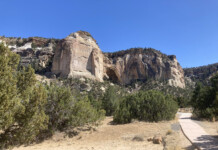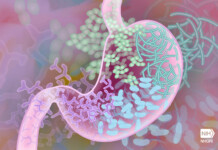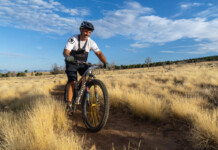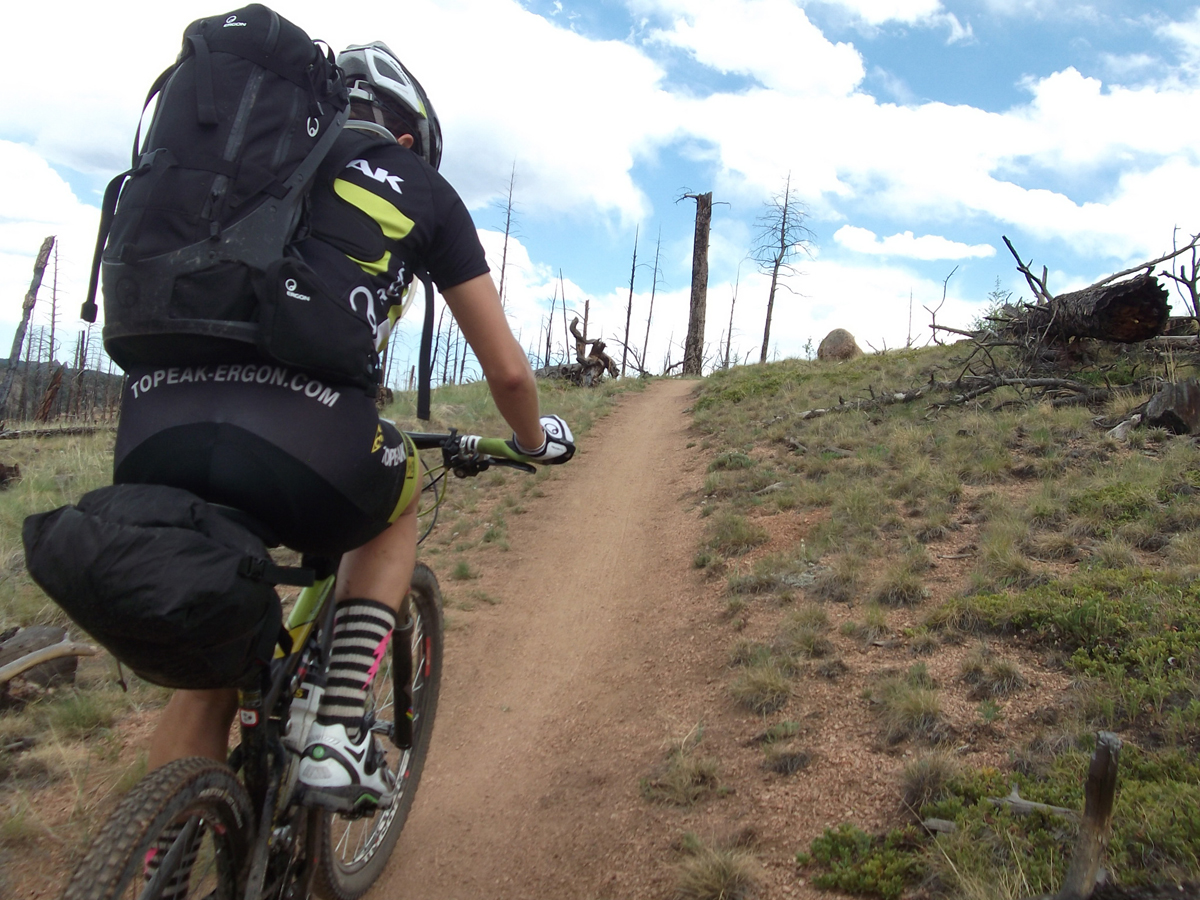By Tom Diegel — It’s no secret that Colorado has more than its share of great riding, from many long road passes that go high into the mountains to a big chunk of the Great Divide Route to a lot of great singletrack. Crested Butte (CB) – partly as the town credited with the origin of mountain biking, and partly as a famous destination for a zillion miles of beautiful, high altitude, narrow, hand-hewn quality singletrack with a surprisingly-chill resort town – is venerated as Colorado’s heart of mountain biking. What is less known is that it is also a great center for bikepacking, with some of the most scenic and challenging tours in the West. As summer still kept its blistering tentacles on Salt Lake in early September we decided to head to the high and cooler Crested Butte to – of course – slay a lot of singletrack, and also use the opportunity to do one of those vaunted bikepack routes as well.
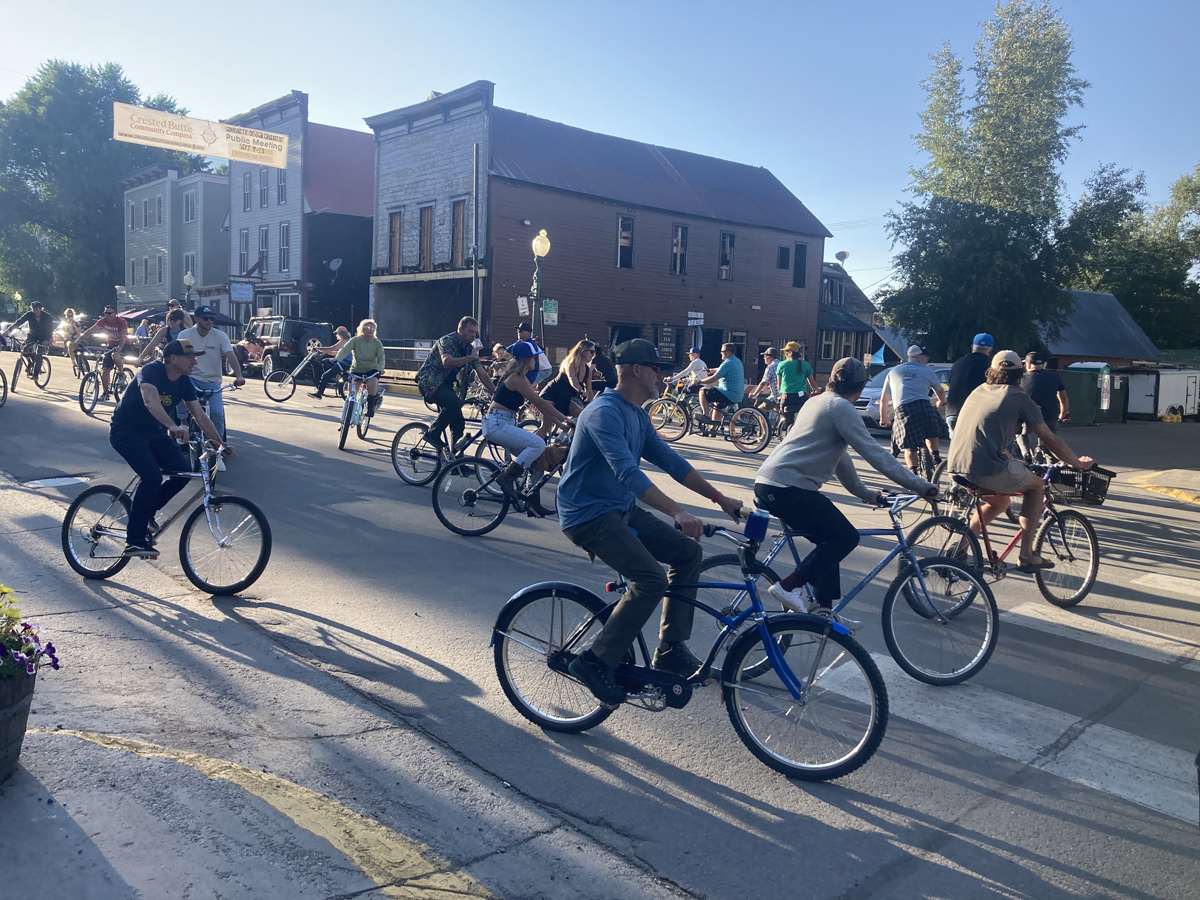
This year’s bikepack journey actually had its genesis in 2013, when Crested Butte was on a route that we did from Steamboat Springs to Grand Junction (and trained home on Amtrak) via the Great Divide Route, Buena Vista, Cottonwood Pass, and Gunnison. In Gunnison we had stopped at a bike shop for some sort of needed part, and Ashley asked one of the employees about riding over Pearl Pass to Aspen. “You can’t do that!” the guy exclaimed. Huh? Why not? ‘That’s WAY too hard!” To be sure, this was in the early days of ‘bikepacking” and we had more old school gear like panniers, but…..c’mon….”you can’t do that?” We of course were tempted to give it a go just to prove that righteous-sounding guy wrong, but the better route for us at that time was to go over the 10,700-foot Schofield pass and down into the beautiful Crystal River valley that was a more efficient way for us to get to Grand Junction. On that 2013 trip we did, however, get a good taste of Colorado’s old and high mining road touring, since the descent down from Schofield to the sleepy hamlet of Marble (fittingly littered with huge slabs and boulders of white marble) is super steep, rocky, and loose for the first few miles. So on our recent trip back to Crested Butte we heard that Pearl Pass – and Taylor Pass, and Star Pass; the other two passes that loomed on our tour – was much more difficult on both sides than Schofield, we had a bit of a sense of what we might be getting into.
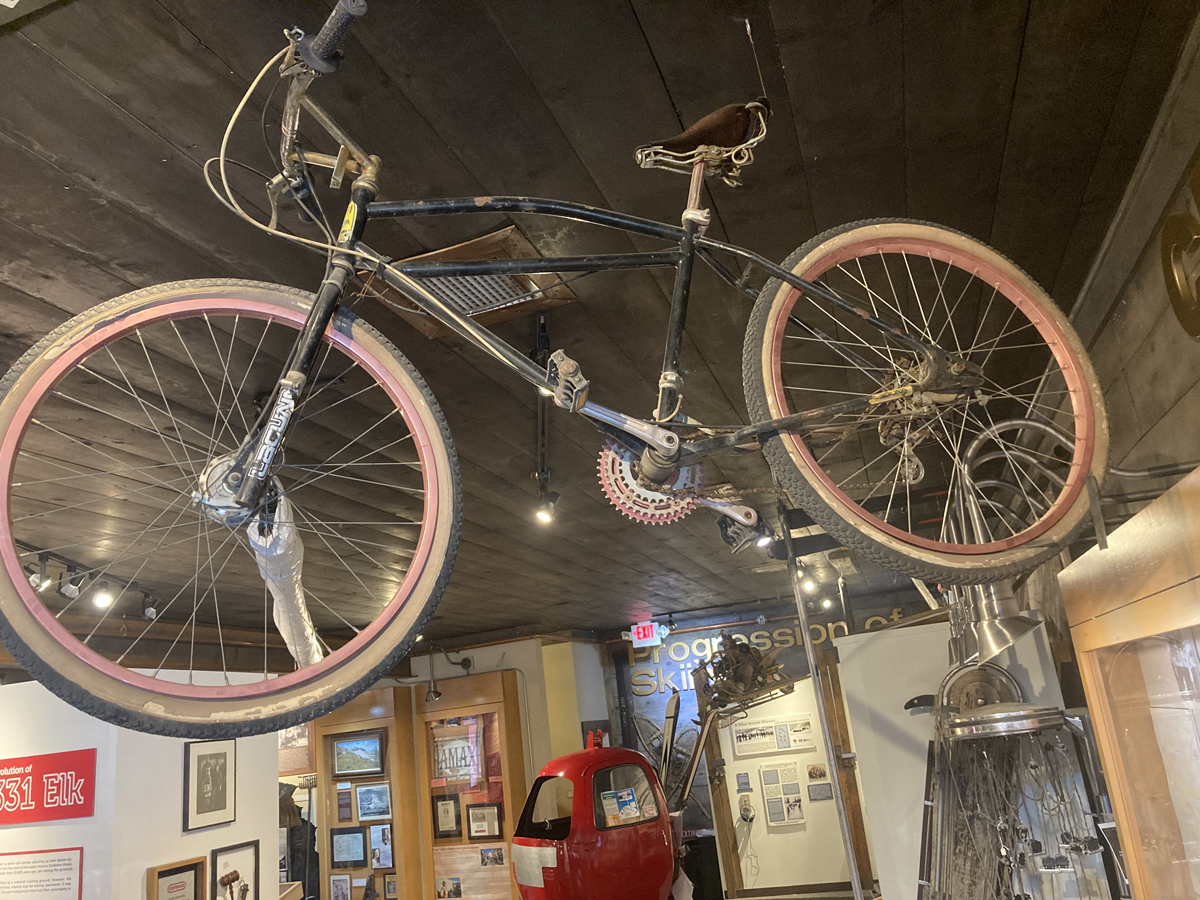
A vital stop for mountain bikers riding in CB is the museum. Like many western towns the museum has lots of mildly interesting history of the local mining and logging that created the town, the notable characters who led the town through the ages, and of course the evolution of the ski resort. But unlike most other museums, the CB museum also has a big display of not only telemark skiing, which has its American roots in CB, but also mountain biking. In about 1973 someone’s likely-drink-inspired suggestion to ride up to Pearl Pass on their townie “Klunkerz” bikes got taken seriously by a bunch of folks, and they did it, with some fun documentation that is featured in the 2006 documentary appropriately called “Klunkers”. Seeing the various bikes circa 1976 hanging in the museum that were actually used for the first Pearl Pass ascents we naturally felt “well, how hard can it be?” Sure we were going to have a bit of gear, but we were going as light as possible and we have fancy mountain bikes…it can’t be “WAY too hard!”
After a coupla days of riding the oh-so-fun singletrack of Crested Butte (including another climb of Schofield Pass to descend the iconic 420 trail) we loaded up the bikes right in town and headed out Brush Creek; the big valley to the west of town and the backside of Crested Butte Peak. Like most Colorado towns there was a great gravel path next to the busy highway heading towards Gunnison (Colorado’s government is really good about investing in recreation infrastructure) that led to a paved road that fairly quickly turned to quiet gravel and shortly after to doubletrack, and the climb began.
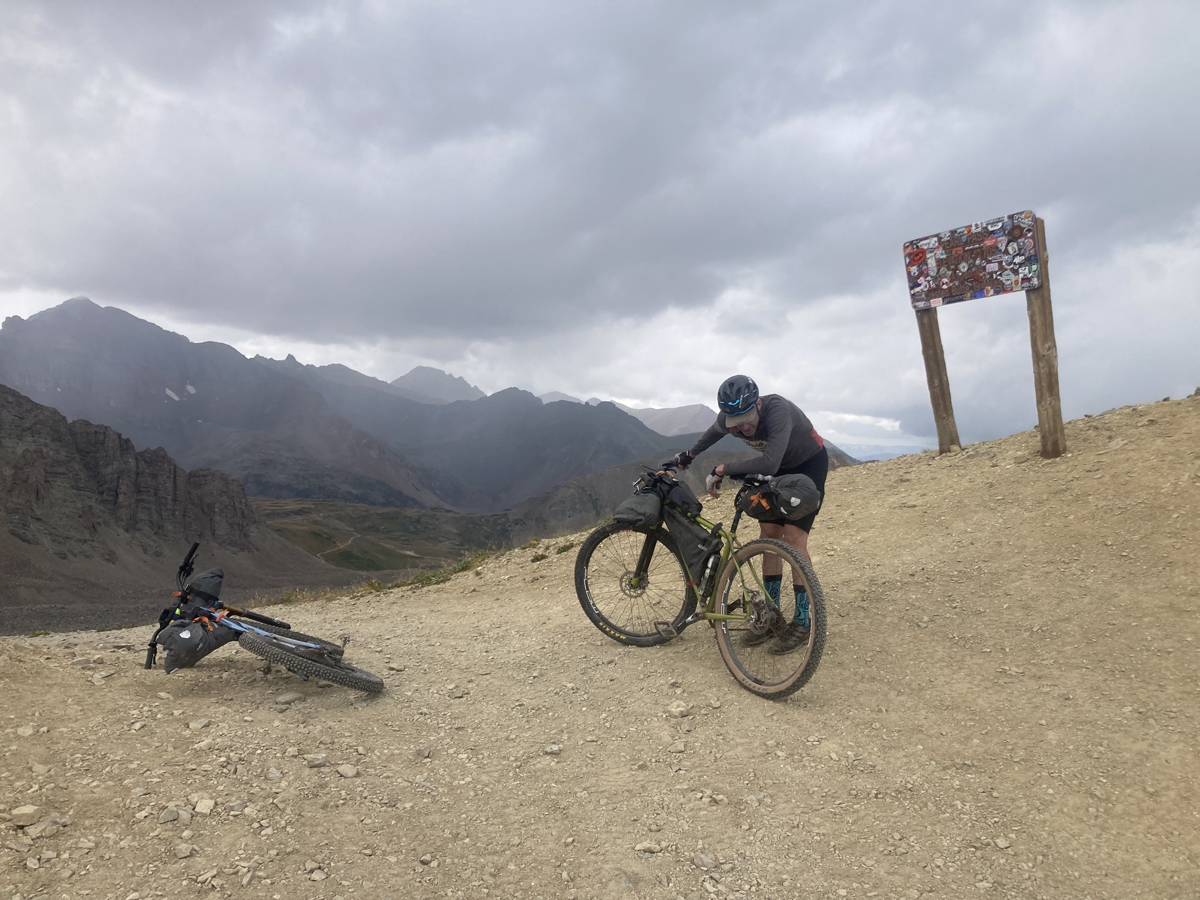
We gradually climbed through a beautiful aspen forest and the double track wasn’t too steep and was still mostly dirt, but as we approached the treeline it got….rocky. They don’t call them the “Buffed Dirt Mountains”, and we found ourselves pushing a fair bit to get through the combination of embedded rocks and baby heads up the steep grades. The climb is only 8 or 9 miles, but given the surface, grades, and 12+ thousand feet it’s….slow goin’, . I actually began to see how “klunkers” could make it up there; there’s very little actual “riding” of the bikes! But of course, the higher we got into the Elks mountains the more their grandeur spread out beyond us, and occasional flatter spins and glances around whilst pushing the bikes indicated some amazing alpine scenery.
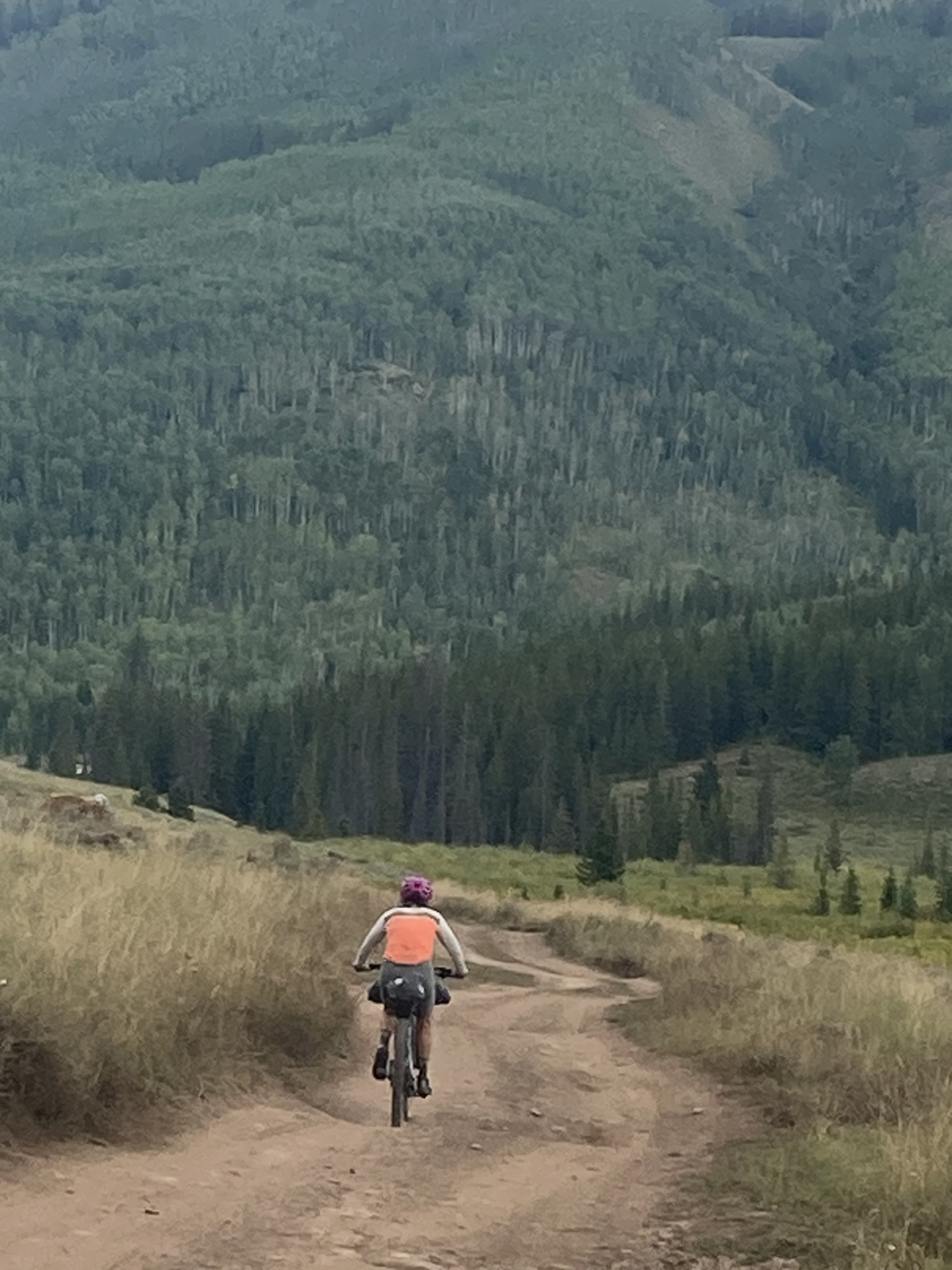
There’s a bit of a false summit to the pass, and the last 3/4 of a mile is thankfully somewhat lower-gradient, rideable dirt, but with mushy legs up high it’s still a nice grind to reach Pearl Pass proper. We didn’t linger long, however; in addition to the higher elevations that Coloradans love to always point out, monsoonal thunderstorms are prevalent, and we were keen to get down off the exposed ridge as quickly as possible. But like Schofield Pass, the north side of Pearl Pass is super rocky, and barely rideable, and it was difficult to make time. At least it was starting to rain, making the impressively-large, impressively-embedded rocks really slick as well, and though we didn’t have to deal with the pesky breeze associated with zipping downhill on bikes, the temps dropped dramatically with the rain. But we persevered, and as we approached the treeline we heard the whine of a motor that soon enough became clear enough to discern that it was a chainsaw, and I caught a glimpse of some sort of manmade structure. “Nice.” I thought. “Probably a hunting camp getting set up, and we can see if we can talk our way into the tent to get out of the rain and warm up.” But as we got closer I realized that the tent became the roof of a full on hut, and the chainsaw was being wielded by a guy cutting wood for the hut for the winter. The cutter said “sure, go ahead and go inside”, where we found a full on gas stove, and in a few minutes we were cupping our hands around a mug of hot tea, so psyched!
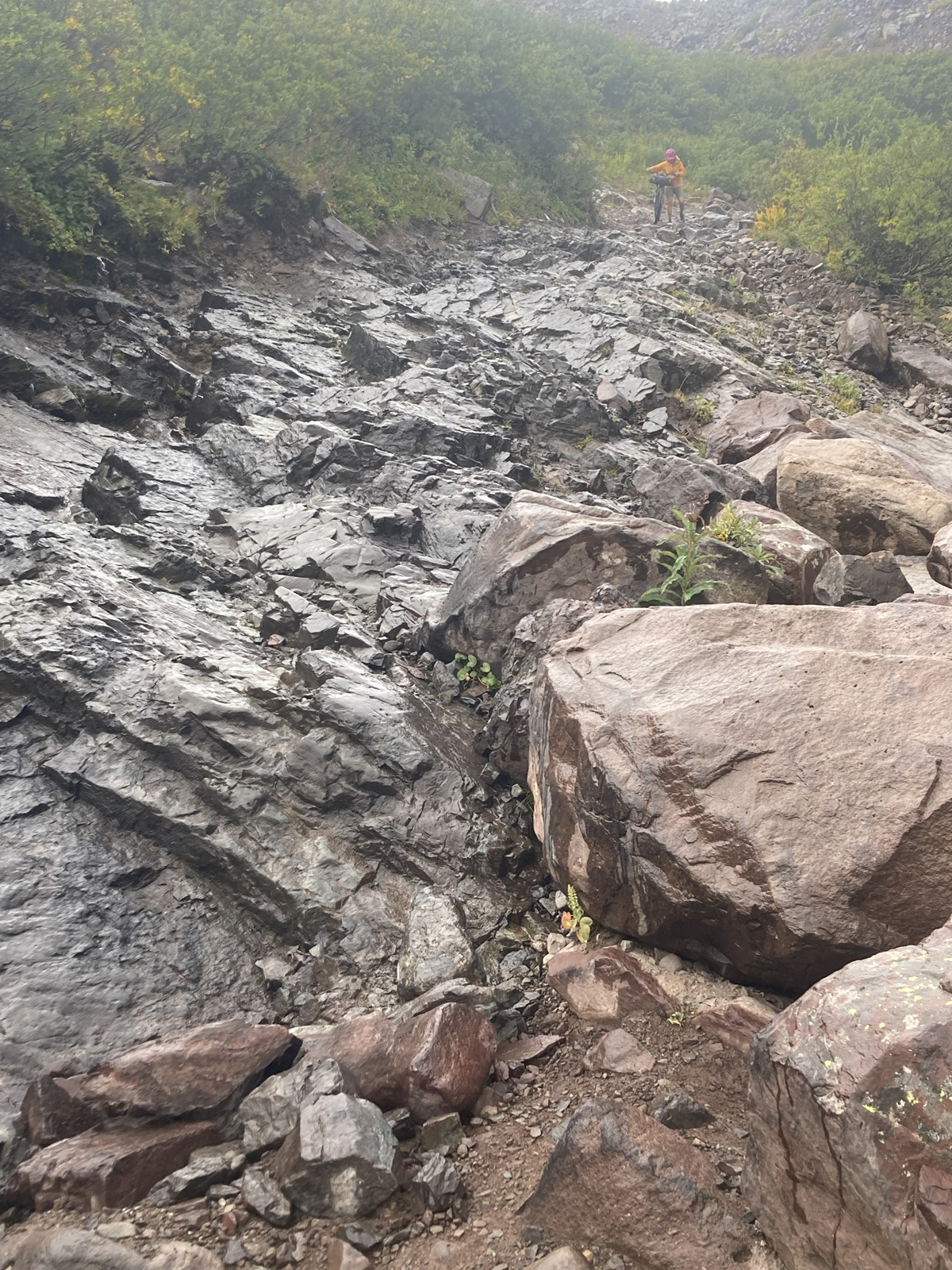
After we warmed up a bit we wandered through the persistent rain over the wood cutter and meekly asked “hey, could we maybe stay here tonight?” No, was the reply. This is a backcountry ski hut, only “open” in the winter. Okay, whatever, no problem. We went back to the hut to get ready to go, when another guy showed up, and we mentioned our query about staying there. To our surprise, this guy said “sure!” To keep things above board we pointed out that his pard said no, but his response was simple: “Well, I’m The Director!”. We were in. An unexpected but welcome shelter for the night, that probably shouldn’t be counted on (but looking cold, hungry, and tired might be an in).
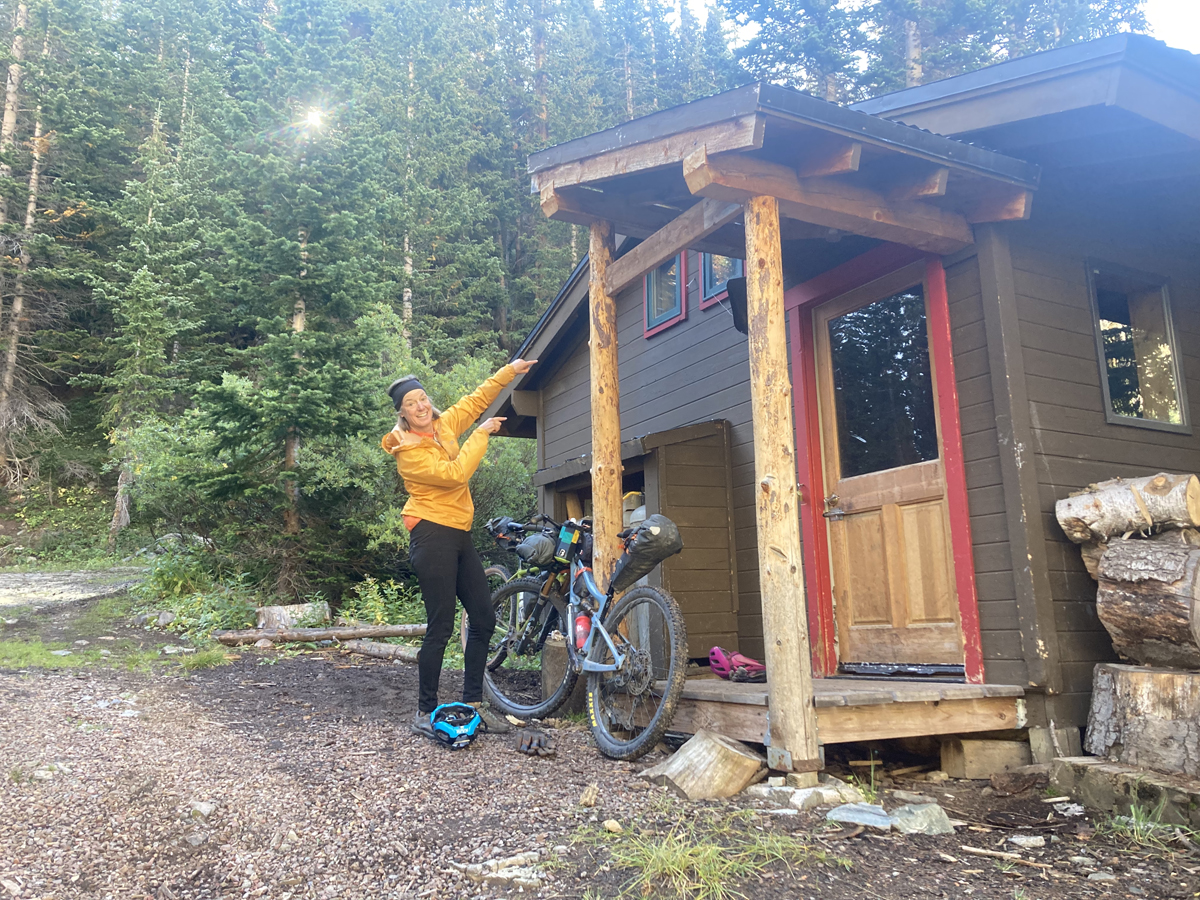
sure nice. Bikepacking Crested Butte’s Elks Traverse. Photo by Tom Diegel
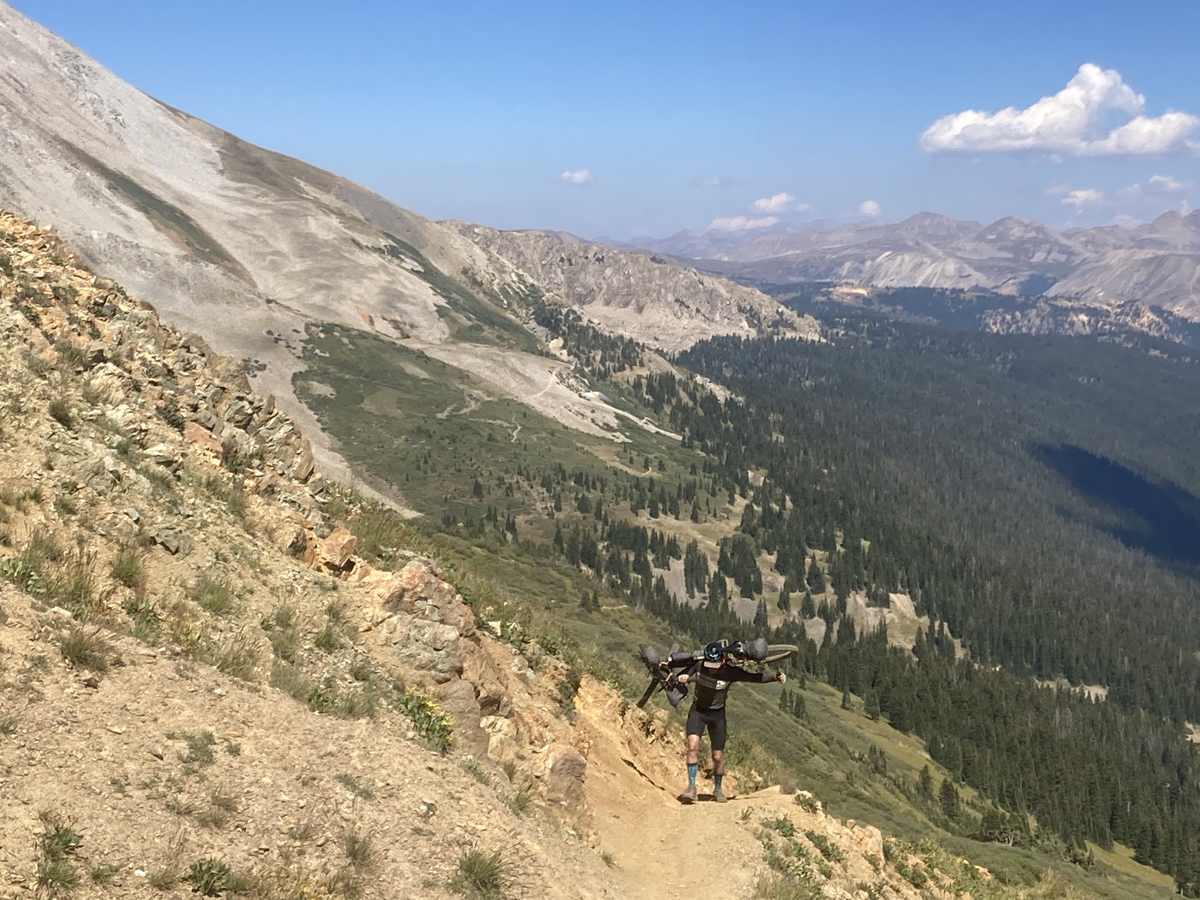
In the morning (frosty! again, so psyched we were in the hut, and not being out exposed with our minimal gear) we bounced down another thousand feet of loose rocky double track that improved to the point of being pavement, and shortly came to a turn onto another double track that led up to Taylor Pass; this one enabled a bit more riding and topped out at only 11,800 feet, but we still got in plenty of quality pushing over rocks (and the equally-commensurate big views). A traversing trail led us back into the upper Taylor basin where we met more double track, and then a single track plunged off that into a basin that we had to climb out of to get to 12,000+ foot Star Pass. The final climb up the north side of Star Pass is singletrack that is barely walkable, much less rideable, but it’s pretty short and part of the big views from Star Pass includes seeing a very rideable singletrack heading 3000 feet down towards Crested Butte. From Taylor Pass to Star Pass and Crested Butte is going backwards on the Grand Traverse; an annual 40+ mile backcountry ski race from CB to Aspen that’s been going on for nearly 30 years, and has recently added summertime versions by wheel and by foot as well, and as such the trail up the south side of Star Pass is pretty rideable and makes for a super long and stellar descent back into the Brush Creek Valley and back into town.
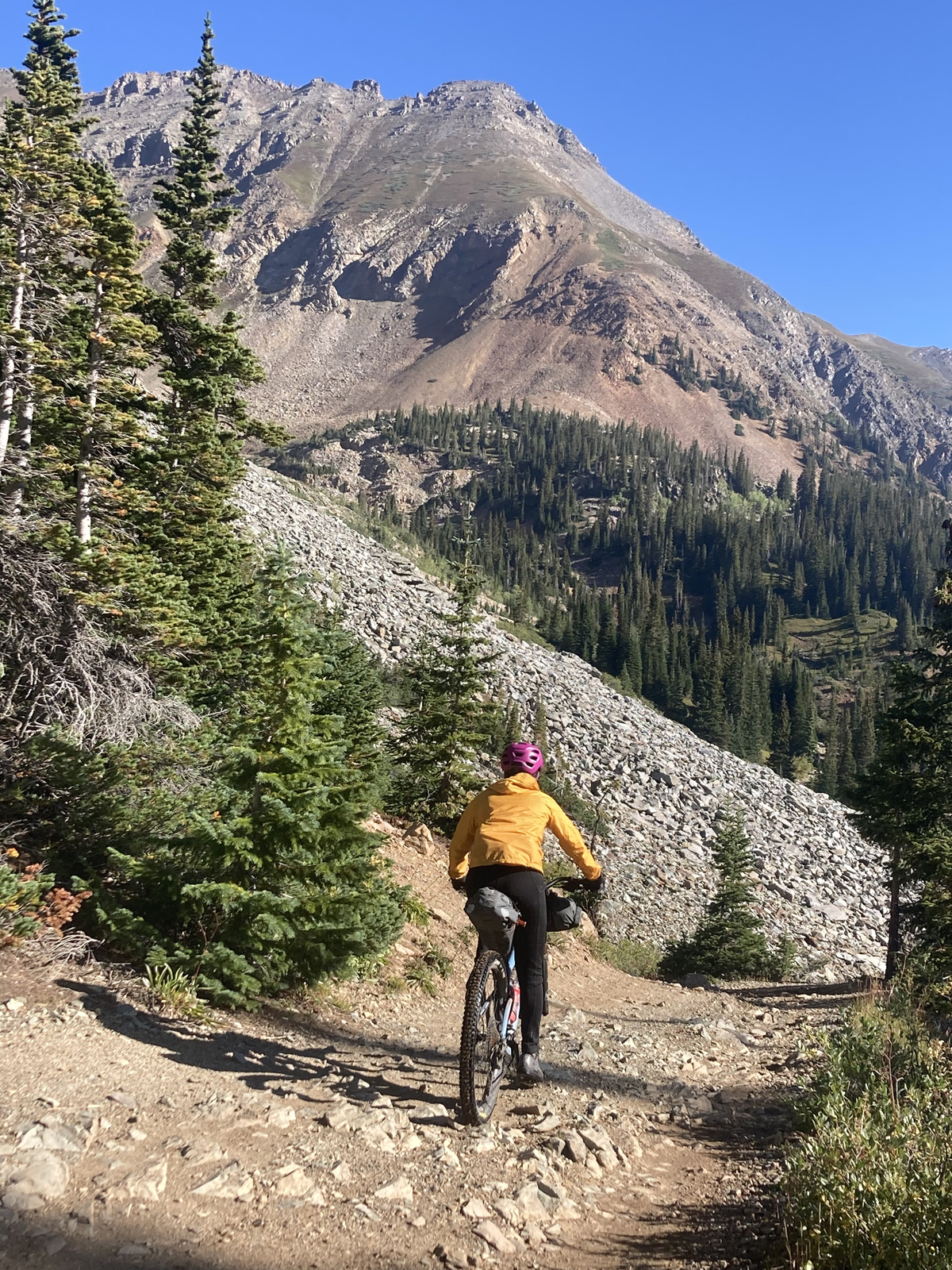
As we relaxed that evening over a meal at one of the many great restaurants in CB, the mellow buzz of the main street was suddenly overwhelmed with thumping music and bike bells; it was the Klunker parade! As it turns out, the next day was the annual Klunker ride up to Pearl Pass that’s been happening annually on the first Saturday in September since the original in the mid-70’s, and apparently there’s almost always at least 40 or 50 people who “ride” up there while 4×4’s go up with camping gear and it’s apparently a great high elevation party.
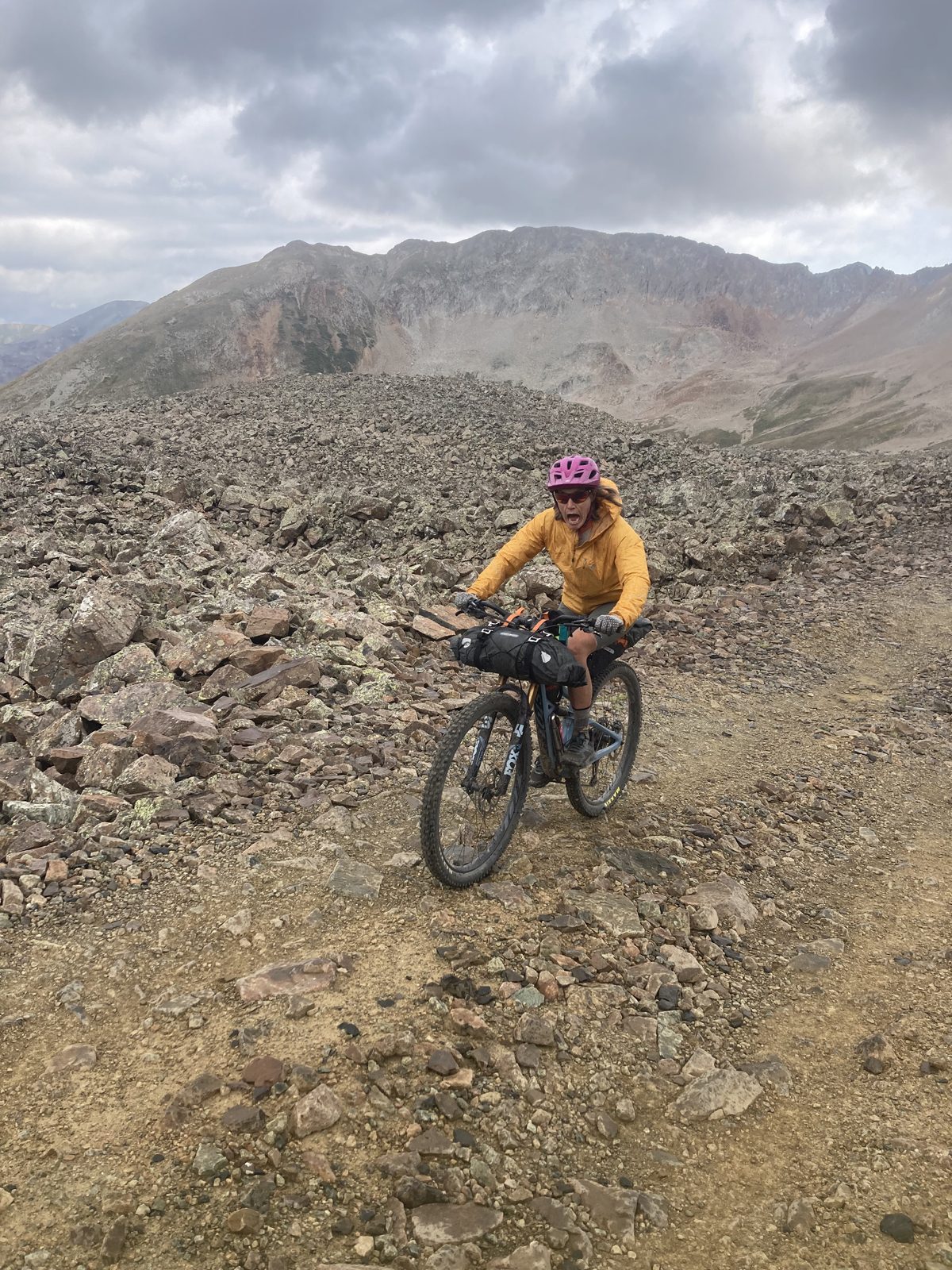
The “Elks Traverse” is detailed on bikepacking.com, where there’s a great 10 minute video and the unusual rating of a 10 in terms of difficulty; now we know what a 10 is on their scale! Though it’s not the fabled Crested Butte singletrack, doing a quick overnight – or if you’re feeling pretty hard – a day shot to do the mighty Elks Traverse is a fun way to get pretty intimate with that area’s “Rocky” mountains.

